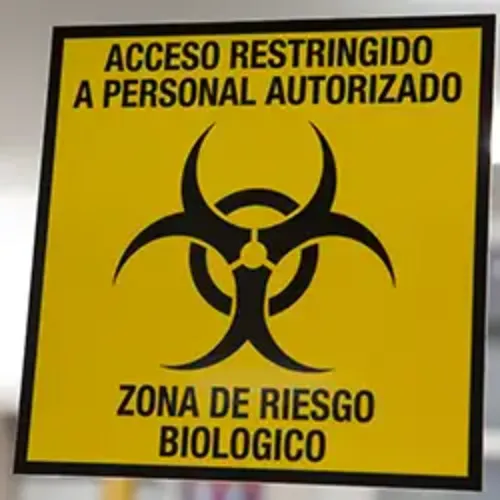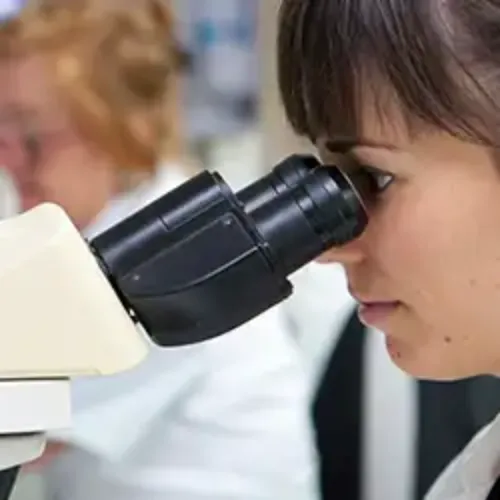Clinical Microbiology
"The development of new technologies, faster and more precise, has transformed molecular diagnosis into a key tool for the clinical team in direct benefit of the patient".
DR. JOSÉ LUIS DEL POZO DIRECTOR. CLINICAL MICROBIOLOGY DEPARTMENT

The Microbiology Service identifies, through various laboratory procedures, the cause of infectious diseases and potentially effective antimicrobial agents.
In order to identify these causes and develop an effective therapy, it is essential, first of all, to isolate and identify the microorganisms responsible for each clinical picture.
Infectious diseases have been transformed thanks to molecular diagnostic tests. The main explanation for this development is due to the difficulty of detecting a pathogen by means of classical microbiology. The prolonged periods of growth of the microorganisms, the conditions of culture and the obtaining of a suitable sample are the major factors that affect the traditional microbiological diagnosis.
Considering that molecular biology techniques are based on the detection of DNA segments, it is not necessary the presence of a viable microorganism in the sample, but only its genetic material.
The high sensitivity values of specificity of molecular diagnostic techniques, together with the speed with which results can be obtained have transformed them into the techniques of choice for the diagnosis of infectious diseases.
The emergence of tropical diseases in our country may be due to population movements, such as immigration and tourism, which facilitate the arrival of microorganisms from other parts of the world. The close collaboration between the physicians who attend to travelers and immigrants and the physicians responsible for the laboratory facilitates the achievement of diagnostic objectives by optimizing resources.
The Clinica also has a Biosafety Laboratory level 3 (BL3), which allows the handling of biological agents that cause diseases potentially lethal to humans. The laboratory has a special design and characteristics and all the samples are manipulated using appropriate protective equipment.
The personnel of this laboratory have specific training in the handling of pathogens and potentially lethal agents, and are supervised by competent scientists with experience in working with these agents.

Specialized units for a better attention
IN NAVARRE AND MADRID
BACTERIOLOGY
-
Sterile specimens, exudates and blood cultures (conventional and quantitative)
-
Cultures for neonatal infection prevention
-
Liquid and solid media cultures
-
Antigen detection for rapid diagnosis
-
Rapid antimicrobial identification techniques and antimicrobial susceptibility profiling
-
Detection and surveillance of antimicrobial resistance mechanisms.
-
MALDI TOF
MICOBACTERIAS (BL3)
-
Tuberculosis and other mycobacteriosis
-
Conventional and automated crops
-
Antigen detection and molecular identification techniques
-
Determination of antibiotic sensitivity profile using automated and molecular techniques
-
Rapid techniques for identification and profiling of antimycobacterial susceptibility to antimycobacterials
-
MALDI TOF
SEROLOGY
-
Serological diagnosis of infectious diseases by detection of antibodies/antigens (ELISA, immunofluorescence, immunochemiluminescence, agglutination)
-
Determination of specific cellular immunity (Quantiferon) against CMV and tuberculosis
VIROLOGY
-
Cultivation and maintenance of cell lines for virus isolation
-
Rapid techniques for detection of viral antigens
-
Virus isolation in cell culture and observation of cytopathic effect
-
Viral identification by fluorescence and antibody techniques
-
Phenotypic studies of herpes simplex virus sensitivity to antivirals
PARASITOLOGY
-
Direct observation techniques
-
Rapid antigen detection
MYCOLOGY
-
Cultures and conventional identification techniques
-
Determination of susceptibility to antifungals
MOLECULAR BIOLOGY
-
Molecular diagnostics based on conventional and real time PCR
-
PCR-based syndromic panels (meningoencephalitis, gastrointestinal, pneumonia, urethritis, genital ulcers, etc.)
-
Viral load monitoring (hepatitis, HIV, herpesvirus, polyomavirus, adenovirus, etc.).
-
Viral genotyping and detection of antiviral resistance mutations by PCR and sequencing
-
Bacterial and fungal identification by PCR and sequencing
Do you need to request a consultation with one of our specialists?
BIOLOGICAL AGENTS
Biosafety Laboratory level 3
Within the biological safety measures required in this type of facility, the Clinical Microbiology Service's BL3 laboratory has been designed in accordance with Canadian legislation, one of the most advanced and safest in the world, and the guidelines of the World Health Organization (WHO).

Biological agents
Some of the microorganisms that are processed in BL3 laboratories are those that cause avian flu, anthrax, tuberculosis, Malta fever, dengue fever, HIV or mad cow disease.

Laboratory activity
Detection of group 3 biological agents (according to RD 664/97) in clinical samples, mainly through isolation, culture and subsequent identification and study of sensitivity to antimicrobial agents.

Facilities
The facilities consist of four independent compartments (airlocks) that must be passed through before arriving at the laboratory, so that the air only circulates inside the laboratory and never leaves it.

Why choose the Clinic?
- Cutting edge technology.
- Quick diagnosis to start the most appropriate treatment early.
- Teamwork with the rest of the professionals in the Clinic.
Our team of professionals
RESEARCH
Clinical trials for the newest treatments
We lead clinical trials to discover new therapies that help effectively treat and improve the quality of life of patients suffering from infectious problems.
Participating in these trials offers new possibilities to patients allowing access to the latest therapeutic advances.








